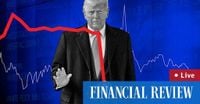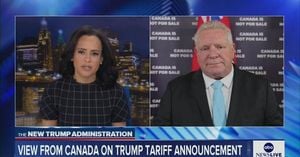On April 3, 2025, the Australian share market took a significant hit, erasing nearly $31 billion in value following a series of aggressive tariff announcements from U.S. President Donald Trump. By lunchtime, the S&P/ASX 200 index had dropped 99.8 points, or 1.3%, settling at 7834.7, as investors reacted to the implications of the tariffs on both local and international markets.
Trump's announcement included a baseline 10% tariff on all countries, which, while initially perceived as less severe than expected, was coupled with country-specific tariffs that raised alarm bells among traders. China was hit hardest, facing a staggering 34% tariff, while the European Union and Japan were subjected to 20% and 24% tariffs, respectively. These tariffs come on top of earlier 20% tariffs imposed on China earlier this year, raising concerns about a potential global recession.
As a direct consequence of these developments, equities across Asia experienced sharp declines, with the Nikkei index falling by over 3%. The U.S. futures markets also reacted negatively; contracts for the S&P 500 and Nasdaq both plummeted by more than 3% shortly after the announcements.
In Australia, the technology sector bore the brunt of the fallout, declining by 2.7%, while the financial sector shed 1.7%. Notable losses were recorded by major players such as Tesla, which dropped by over 8%, Apple at 7.1%, and Amazon by more than 6% in after-hours trading on April 2, 2025.
Among the Australian stocks, the medical equipment manufacturer Ansell saw the largest decline, plummeting 12.1%. The company, which exports a significant portion of its products to the U.S., is re-evaluating its manufacturing strategies in light of the new tariffs. Similarly, Cettire, a global luxury fashion platform, dropped 12% after warning investors that it may need to raise prices in its key U.S. market due to the tariffs on European-made goods.
Despite the overall market downturn, not all stocks were negatively impacted. BlueScope Steel gained 0.6% after Jarden Securities upgraded its rating to overweight, anticipating that the company would benefit from the U.S. government's push to protect domestic industries.
Meanwhile, in corporate news, Treasury Wine Estates saw a modest decline of 1.9% despite the company assuring investors that the new tariffs would have a minimal impact on its operations, given that only 15% of its wines are imported from outside the U.S.
As the market digested the implications of Trump's tariffs, investors began to speculate on potential interest rate cuts by the Reserve Bank of Australia (RBA). The heightened fears of a recession have driven traders to increase bets on a 25 basis point cut in May 2025.
In a contrasting scenario, Synlait Milk Ltd, a New Zealand-based dairy processing company, saw its shares rise despite the broader market's struggles. On April 3, 2025, Synlait Milk shares surged by 12% to 74.5 cents before settling at 71.5 cents, up 7.5%. This increase was driven by the company's announcement of significant progress in securing its milk supply, with the majority of cease notices from dairy farmers being withdrawn.
Acting CEO Tim Carter expressed optimism, stating, "Our farmers are the backbone of Synlait; their support provides us with valuable certainty and reflects growing confidence in the company on the back of our return to profitability." Synlait Milk reported a remarkable 16% year-on-year revenue increase to NZ$916.8 million for the half-year ending January 31, 2025, with a net profit after tax of $4.8 million, marking a 105% rise.
As the global economic landscape continues to shift in response to Trump's tariff policies, analysts caution that volatility in stock prices is likely to persist. The magnitude of the tariffs, described as one of the largest waves ever imposed in U.S. history, is expected to have far-reaching implications for international trade and economic stability.
The Australian Agricultural Company also found itself in the spotlight after Trump's comments regarding beef exports. He noted, "But they ban American beef... yet, we imported $3 billion of Australian beef from them last year alone," highlighting the complexities of trade relationships and the potential impacts of the new tariffs.
In summary, the Australian share market's response to Trump's tariff announcements underscores the interconnectedness of global economies and the potential for significant repercussions on local markets. As investors brace for further developments, the focus will remain on how these tariffs will shape the economic landscape in the coming months.






